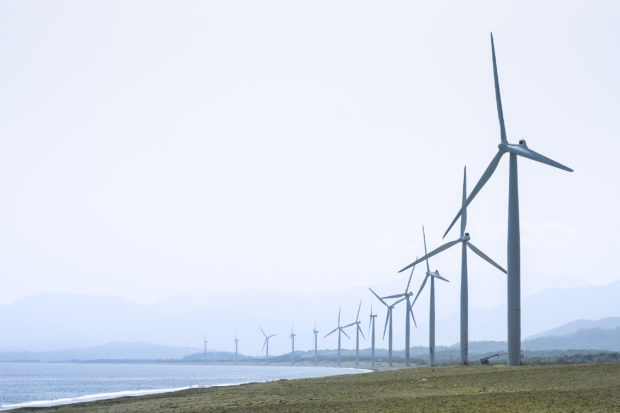Globe backs Race To Zero CO2 emissions campaign
![]()
Globe Telecom puts into action its commitment to reduce its carbon footprint by actively supporting the Race To Zero global campaign spearheaded by the United Nations Framework Convention on Climate Change (UNFCCC) and COP26 Presidency and backed by the GSMA, the global mobile industry body. This activity is part of the GSMA’s bid to lower greenhouse gas (GHG) emissions to net zero no later than 2050 through the collective efforts of all mobile network operators around the world.
The Race To Zero was launched on June 5 in time for the World Environment Day celebration. The campaign, which involves a major multi-stakeholder coalition of leaders, aims to send a resounding signal to governments that businesses, cities, regions and investors are united in achieving net zero emissions and in creating a more inclusive and resilient economy.

Globe utilizes renewable and clean energy coming from wind power sources. Photo from AC Energy.
“We are one with global mobile operators in helping the mobile industry achieve net zero carbon emissions by 2050. We acknowledge that this requires a collective effort to realize large-scale positive impact. We thank the GSMA for this initiative and for utilizing scientific measures to ensure a low carbon future benefiting our entire ecosystem,” said Globe President and CEO Ernest Cu.
“The mobile sector is a fundamental part of today’s and the future global economy, and our industry has a unique role to play in reaching a Net Zero economy. We are showing this leadership and taking responsibility for driving positive climate action,” said Mats Granryd, Director General, GSMA. “The GSMA is working with participating operators and partnering with the international community, climate experts and third-party organisations to advance industry progress, establish best practices, and support disclosure and target setting.”
Earlier this year, the GSMA led the development of a mobile industry climate action roadmap that adopted the Science Based Targets Initiative (SBTI) to chart a resilient, zero-carbon future for network operators. Globe was among the first 50 mobile operators in the world to take action on carbon disclosures and to manage the impact of its operations on the environment.
With carbon dioxide, methane, and other harmful GHG being continuously released to the atmosphere, it is estimated that global average temperatures will go up between 1.5 and 5 degrees Celsius in many locations in the next 30 years.
The situation could lead to intensifying climate hazards that “could put millions of lives at risk, as well as trillions of dollars of economic activity and physical capital, and the world’s stock of natural capital,” according to the report on “Climate risk and response: Physical hazards and socioeconomic impacts” released by McKinsey Global Institute early this year. It found that all 105 countries studied are expected to experience an increase in at least one major type of impact whether on livability and workability, food production, physical assets, infrastructure, or natural capital by 2030 due to extreme heat, extreme precipitation, flooding, forest fires, melting ice caps, among other hazards.
Recognizing these threats, Globe has started its journey towards decarbonizing its operations and enhancing clean energy procurement by buying power bundled with verified carbon offsets sourced from renewable energy plants. It has also engaged partners to implement renewable energy solutions like solar panels and fuel cells within its operations.
For instance, by securing and retiring carbon offsets coming from renewable energy sources, Globe was able to achieve carbon neutrality for the electricity consumption of its headquarters and two other offices in Cebu and Quezon City. This earned Globe the Gold Standard Verified Emission Reduction (VER) which assures the company’s capability to declare 100% offsetting of carbon dioxide (CO2) emissions associated with its electricity consumption.
VER is a certificate awarded to projects, mostly in developing countries, that decrease or avoid CO2 emissions. It is attained through verification of avoided carbon impacts by renewable energy installations such as solar, wind farms and hydropower plants, as well as through energy-efficiency projects. It is backed by recognized international quality standards such as the Voluntary Carbon Standard and the Gold Standard.
Globe currently has a three-year contract with AC Energy for the offsetting of its carbon emissions in its facilities without any effect on the quality of power supply. AC Energy is the energy platform of Ayala Corporation, with over US$1 billion of invested and committed equity in renewable and thermal energy in the Philippines and around the region.
Aside from its buildings, Globe has deployed green solutions such as fuel cell systems, direct current (DC)-Hybrid Generator, free cooling system, and lithium-ion batteries to achieve energy efficiency in its cell sites. These solutions use cleaner fuel with lower emissions, consume less diesel fuel, and provide energy efficient heat removal.
The company has decommissioned legacy machines to ensure only energy efficient systems are used for its operations and is also preparing to gain ISO 50001 Certification for energy management to ensure that a structured management system is in place to reduce energy consumption. Globe, likewise, operates ISO-certified and energy efficient data centers and implements waste management for electronic waste and for single use plastics in the Globe headquarters. It also offsets its carbon footprint through tree planting and reforestation programs.
Aligned to its carbon emission reduction targets, Globe is continuously seeking innovative means and adopting best practices to enhance energy and resource efficiency. As a purpose-driven company, Globe remains committed to the 10 UN Global Compact principles and contributes to 10 of the UN Sustainable Development Goals.
To know more about Globe’s sustainability initiatives, visit https://www.globe.com.ph/about-us/sustainability.html